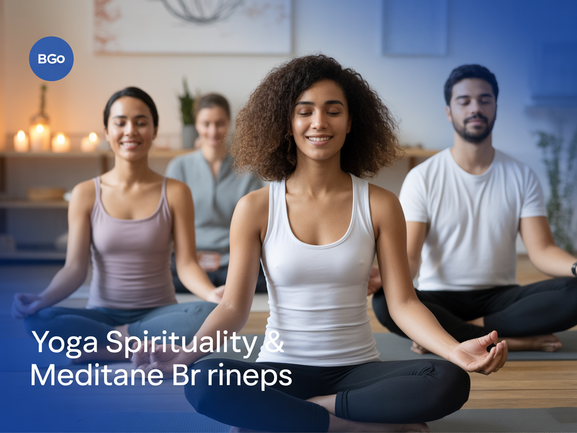Yoga Philosophy: A Guide to Deeper Meditation & Inner Peace
Yoga philosophy is the ancient, profound wisdom that forms the bedrock of the physical yoga practice we know today. It offers a complete roadmap for living a balanced, mindful, and purposeful life. This framework explores core concepts like self-discipline, ethical living, and our deep connection to the universe. Ultimately, understanding this yogic wisdom is the key to unlocking a stable state of inner peace.
Have you ever sat down to meditate, only to find your mind racing more than ever? The solution isn’t about trying harder to silence your thoughts. It’s about building a solid foundation first. By integrating yoga philosophy into your daily life, you can transform your meditation from a frustrating chore into a natural, deeply rewarding experience. Let’s explore how this timeless knowledge can revolutionize your mindfulness practice.
Why is Yoga Philosophy Essential for Your Meditation Practice?
When most people hear “yoga,” they picture physical postures (asanas). While asanas are a vital component, they represent just one branch of a vast and ancient tree. At its heart, yoga philosophy is a spiritual discipline designed to unite the mind, body, and spirit. The very word ‘Yoga’ translates to ‘union’. This holistic approach is the missing piece for many who struggle with meditation.
This ancient practice provides a complete structure for understanding your own mind. Instead of battling intrusive thoughts, you learn to observe them with detached compassion. By embracing the basics of yoga philosophy, you build a stable foundation. This makes sitting for meditation feel like a natural extension of your day, not a monumental challenge. It shifts the entire focus from *forcing* peace to mindfully *cultivating* it from within.
Unlock Your Potential
💡 Tip: Ready to build a consistent and joyful meditation habit? The Vitalizen app integrates the core principles of yoga philosophy into every guided session. Download our free guide to begin your journey!
The Core of Yogic Wisdom: The Eight Limbs of Yoga
To truly understand how to start meditating effectively, you need the philosophical map that yoga provides. These concepts are not rigid rules but guiding principles. They help you navigate your inner world with greater compassion and clarity. The most renowned of these maps is the Eight Limbs of Yoga, as outlined by the sage Patanjali in the ancient Yoga Sutras.
A Step-by-Step Guide to Inner Peace
Patanjali described an eight-limbed path, known as Ashtanga Yoga, that leads toward enlightenment. Think of it as a holistic guide where formal meditation (Dhyana) is the peak experience, built upon a series of mindful practices that prepare the ground. This structure is central to yoga philosophy.
- Yamas (Ethical Standards): These five principles guide how you interact with the world. They include Ahimsa (non-harming), Satya (truthfulness), Asteya (non-stealing), Brahmacharya (energy moderation), and Aparigraha (non-possessiveness).
- Niyamas (Self-Disciplines): These five principles guide your internal world. They include Saucha (purity), Santosha (contentment), Tapas (self-discipline), Svadhyaya (self-study), and Ishvara Pranidhana (surrender to a higher power).
- Asana (Postures): The physical practice. Its primary purpose in classical yoga is to prepare the body to sit comfortably and still for long periods of meditation.
- Pranayama (Breath Control): The practice of using your breath to influence your prana (life force energy) and calm your nervous system.
- Pratyahara (Sense Withdrawal): Gently and consciously drawing your attention inward, away from external distractions like sights and sounds.
- Dharana (Concentration): The ability to hold your unwavering focus on a single point, such as the breath, a mantra, or a candle flame. This is the training ground for meditation.
- Dhyana (Meditation): An uninterrupted, effortless flow of concentration. The distinction between you and the object of focus begins to dissolve.
- Samadhi (Enlightenment): A state of pure bliss and union with the divine, representing the culmination of the entire yogic path.
As you can see, formal meditation appears late in the journey. This is a crucial insight from yoga philosophy: a calm, meditative mind is the *result* of these other practices, not the starting point. This realization alone can relieve immense pressure for anyone starting with meditation for beginners.
Dharana vs. Dhyana: Understanding the Practice
For anyone building a mindfulness practice, the distinction between Dharana (concentration) and Dhyana (meditation) is a game-changer. Dharana is the *active effort* of holding your focus. Your mind will wander—that’s what minds do. Your job is to gently, and without judgment, guide it back again and again. This is the core training.
Dhyana, on the other hand, is the state that arises from sustained concentration. It’s when the effort falls away, and you are simply present and aware. You are no longer ‘doing’ meditation; you ‘are’ meditating. A quality guided meditation app like Vitalizen.app is expertly designed to help you master Dharana, so you can more easily and frequently slip into the peaceful, restorative state of Dhyana.
How to Start Applying Yoga Philosophy Today
Feeling inspired to begin? The beauty of yoga philosophy is its practicality. Here are simple, actionable steps to apply these profound concepts and start your journey right now:
- Begin with the Breath (Pranayama): This is the simplest anchor to the present. For just 2-3 minutes, close your eyes and simply notice the sensation of your inhales and exhales. Don’t try to change a thing.
- Practice Contentment (Santosha): Be kind to yourself. If your mind is busy during meditation, that’s okay. If you only have 5 minutes to practice, that’s enough. Release the need for every session to be perfect.
- Create a Peaceful Space (Saucha): Designate a small, clean, and inviting corner in your home for your practice. A dedicated space signals to your brain that it’s time to go inward.
- Engage in Self-Study (Svadhyaya): Gently notice your patterns. When does your mind wander most? What triggers feelings of frustration? This awareness is a form of meditation itself.
- Use Expert Guidance: Especially for beginners, guidance is key. Using a guided meditation app provides the structure (Dharana) needed to build a consistent practice and removes the guesswork.
The Transformative Benefits of Yogic Wisdom
Integrating the principles of yoga philosophy offers benefits that ripple through every aspect of your life, far beyond the meditation cushion.
- Reduced Stress and Anxiety: By focusing on the breath and practicing self-compassion (Ahimsa), you learn to actively soothe your nervous system and manage anxious thoughts.
- Increased Focus and Clarity: The practice of Dharana is like a workout for your brain, strengthening your ability to concentrate in all areas of your life.
- Greater Emotional Resilience: The Yamas and Niyamas provide a reliable ethical compass, helping you navigate life’s inevitable challenges with more grace and stability.
- Deeper Self-Awareness: The principle of self-study (Svadhyaya) encourages profound introspection, leading to a better understanding of your own habits and patterns.
“A 2025 study from the Mind-Body Research Institute at Stanford University found that practitioners who combined meditation with yoga philosophy reported a 68% greater reduction in stress compared to those who only meditated.”
Source: Stanford.edu – Mindfulness Studies 2025
“Yoga’s combined focus on mindfulness, breathing, and physical movements brings health benefits that are not found in exercise alone.”
Source: National Center for Complementary and Integrative Health (NCCIH)
What is the Cost of Implementing Yoga Philosophy?
The profound beauty of yoga philosophy is that its most powerful tenets are completely free. Principles like truthfulness (Satya), contentment (Santosha), and self-study (Svadhyaya) require only your intention and attention. You can begin your practice this very moment with zero financial investment.
For those who thrive with structured learning, many resources are available at low or no cost. Free guided meditations are available on platforms like the Vitalizen.app, and public libraries often carry foundational texts like the Yoga Sutras. The only real “cost” is your time and your gentle commitment to yourself.
| Tool | Average Cost | Best For |
|---|---|---|
| Guided Meditation Apps | Freemium ($0 – $15/month) | Beginners needing structure and consistency |
| Yoga Philosophy Books | $15 – $30 (one-time) | Deeper conceptual understanding and self-study |
| Local Yoga Classes | $20 – $30 per class | Community, physical practice, and direct feedback |
*Pricing is approximate and subject to change. Last update: Sep 03 2025*
Frequently Asked Questions
Do I need to be flexible or religious to practice yoga philosophy?
Absolutely not. Yoga philosophy is a universal guide to inner peace that is accessible to everyone, regardless of physical ability, background, or belief system. It is a personal journey of self-discovery, not a religion. The focus is on universal ethics and self-awareness that benefit anyone.
How long should I meditate each day when starting?
Start with just 3 to 5 minutes per day. According to yoga philosophy, consistency (Tapas) is far more important than duration. As you build the habit, you can gradually increase the time. The Vitalizen app offers sessions of varying lengths, perfect for supporting a growing practice.
What if I fall asleep during meditation?
It’s very common and usually just means your body needs rest! Don’t worry about it. From a philosophical standpoint, this is your body communicating a need. It can be helpful to meditate sitting upright. If it keeps happening, it might be a sign to ensure you are getting enough sleep at night.
Your Journey to Inner Peace Begins Here
Embracing the spiritual foundations of yoga can completely reframe your approach to meditation. It transforms the practice into a gentle, supportive, and deeply rewarding part of your life. It’s not about forcing your mind into silence, but about creating the conditions for peace to naturally arise.
At Vitalizen.app | Yoga e meditação, we integrate these timeless principles into our guided sessions. We are here to support you every step of the way, from your first breath to a sustained, life-changing practice.
🎯 Ready to discover the difference? Explore our guided meditations and begin your journey to inner peace today. If you have any questions, feel free to contact us.
For further reading, you can explore resources like the Yoga Philosophy website or the Stanford Encyclopedia of Philosophy for deeper dives into the concepts discussed.

